Jie He
JD.com
A data-driven approach to inferring travel trajectory during peak hours in urban rail transit systems
Dec 10, 2025Abstract:Refined trajectory inference of urban rail transit is of great significance to the operation organization. In this paper, we develop a fully data-driven approach to inferring individual travel trajectories in urban rail transit systems. It utilizes data from the Automatic Fare Collection (AFC) and Automatic Vehicle Location (AVL) systems to infer key trajectory elements, such as selected train, access/egress time, and transfer time. The approach includes establishing train alternative sets based on spatio-temporal constraints, data-driven adaptive trajectory inference, and trave l trajectory construction. To realize data-driven adaptive trajectory inference, a data-driven parameter estimation method based on KL divergence combined with EM algorithm (KLEM) was proposed. This method eliminates the reliance on external or survey data for parameter fitting, enhancing the robustness and applicability of the model. Furthermore, to overcome the limitations of using synthetic data to validate the result, this paper employs real individual travel trajectory data for verification. The results show that the approach developed in this paper can achieve high-precision passenger trajectory inference, with an accuracy rate of over 90% in urban rail transit travel trajectory inference during peak hours.
CogVLA: Cognition-Aligned Vision-Language-Action Model via Instruction-Driven Routing & Sparsification
Aug 28, 2025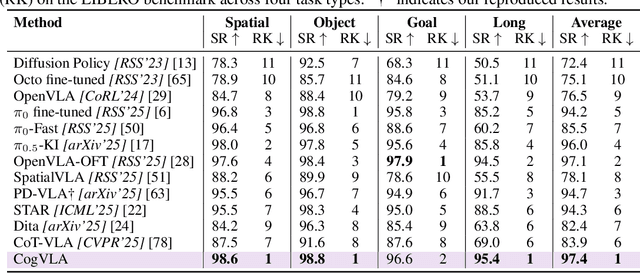
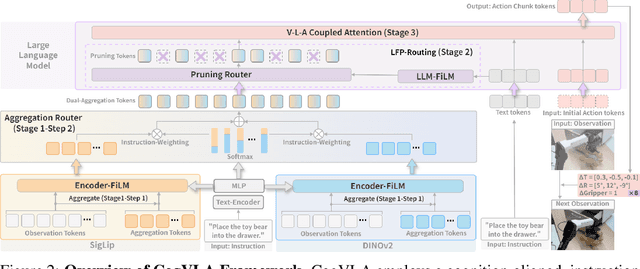

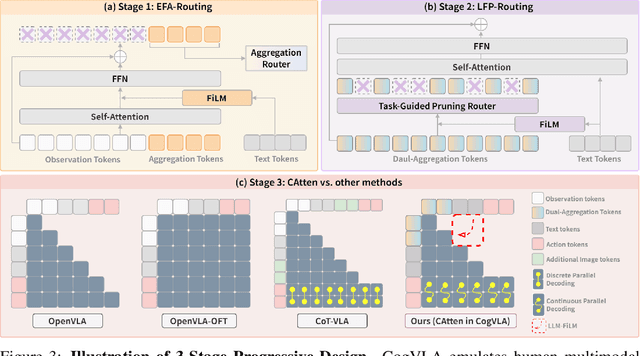
Abstract:Recent Vision-Language-Action (VLA) models built on pre-trained Vision-Language Models (VLMs) require extensive post-training, resulting in high computational overhead that limits scalability and deployment.We propose CogVLA, a Cognition-Aligned Vision-Language-Action framework that leverages instruction-driven routing and sparsification to improve both efficiency and performance. CogVLA draws inspiration from human multimodal coordination and introduces a 3-stage progressive architecture. 1) Encoder-FiLM based Aggregation Routing (EFA-Routing) injects instruction information into the vision encoder to selectively aggregate and compress dual-stream visual tokens, forming a instruction-aware latent representation. 2) Building upon this compact visual encoding, LLM-FiLM based Pruning Routing (LFP-Routing) introduces action intent into the language model by pruning instruction-irrelevant visually grounded tokens, thereby achieving token-level sparsity. 3) To ensure that compressed perception inputs can still support accurate and coherent action generation, we introduce V-L-A Coupled Attention (CAtten), which combines causal vision-language attention with bidirectional action parallel decoding. Extensive experiments on the LIBERO benchmark and real-world robotic tasks demonstrate that CogVLA achieves state-of-the-art performance with success rates of 97.4% and 70.0%, respectively, while reducing training costs by 2.5-fold and decreasing inference latency by 2.8-fold compared to OpenVLA. CogVLA is open-sourced and publicly available at https://github.com/JiuTian-VL/CogVLA.
From Sufficiency to Reflection: Reinforcement-Guided Thinking Quality in Retrieval-Augmented Reasoning for LLMs
Jul 30, 2025Abstract:Reinforcement learning-based retrieval-augmented generation (RAG) methods enhance the reasoning abilities of large language models (LLMs). However, most rely only on final-answer rewards, overlooking intermediate reasoning quality. This paper analyzes existing RAG reasoning models and identifies three main failure patterns: (1) information insufficiency, meaning the model fails to retrieve adequate support; (2) faulty reasoning, where logical or content-level flaws appear despite sufficient information; and (3) answer-reasoning inconsistency, where a valid reasoning chain leads to a mismatched final answer. We propose TIRESRAG-R1, a novel framework using a think-retrieve-reflect process and a multi-dimensional reward system to improve reasoning and stability. TIRESRAG-R1 introduces: (1) a sufficiency reward to encourage thorough retrieval; (2) a reasoning quality reward to assess the rationality and accuracy of the reasoning chain; and (3) a reflection reward to detect and revise errors. It also employs a difficulty-aware reweighting strategy and training sample filtering to boost performance on complex tasks. Experiments on four multi-hop QA datasets show that TIRESRAG-R1 outperforms prior RAG methods and generalizes well to single-hop tasks. The code and data are available at: https://github.com/probe2/TIRESRAG-R1.
FAMSeg: Fetal Femur and Cranial Ultrasound Segmentation Using Feature-Aware Attention and Mamba Enhancement
Jun 09, 2025Abstract:Accurate ultrasound image segmentation is a prerequisite for precise biometrics and accurate assessment. Relying on manual delineation introduces significant errors and is time-consuming. However, existing segmentation models are designed based on objects in natural scenes, making them difficult to adapt to ultrasound objects with high noise and high similarity. This is particularly evident in small object segmentation, where a pronounced jagged effect occurs. Therefore, this paper proposes a fetal femur and cranial ultrasound image segmentation model based on feature perception and Mamba enhancement to address these challenges. Specifically, a longitudinal and transverse independent viewpoint scanning convolution block and a feature perception module were designed to enhance the ability to capture local detail information and improve the fusion of contextual information. Combined with the Mamba-optimized residual structure, this design suppresses the interference of raw noise and enhances local multi-dimensional scanning. The system builds global information and local feature dependencies, and is trained with a combination of different optimizers to achieve the optimal solution. After extensive experimental validation, the FAMSeg network achieved the fastest loss reduction and the best segmentation performance across images of varying sizes and orientations.
FPDANet: A Multi-Section Classification Model for Intelligent Screening of Fetal Ultrasound
Jun 06, 2025Abstract:ResNet has been widely used in image classification tasks due to its ability to model the residual dependence of constant mappings for linear computation. However, the ResNet method adopts a unidirectional transfer of features and lacks an effective method to correlate contextual information, which is not effective in classifying fetal ultrasound images in the classification task, and fetal ultrasound images have problems such as low contrast, high similarity, and high noise. Therefore, we propose a bilateral multi-scale information fusion network-based FPDANet to address the above challenges. Specifically, we design the positional attention mechanism (DAN) module, which utilizes the similarity of features to establish the dependency of different spatial positional features and enhance the feature representation. In addition, we design a bilateral multi-scale (FPAN) information fusion module to capture contextual and global feature dependencies at different feature scales, thereby further improving the model representation. FPDANet classification results obtained 91.05\% and 100\% in Top-1 and Top-5 metrics, respectively, and the experimental results proved the effectiveness and robustness of FPDANet.
N2C2: Nearest Neighbor Enhanced Confidence Calibration for Cross-Lingual In-Context Learning
Mar 12, 2025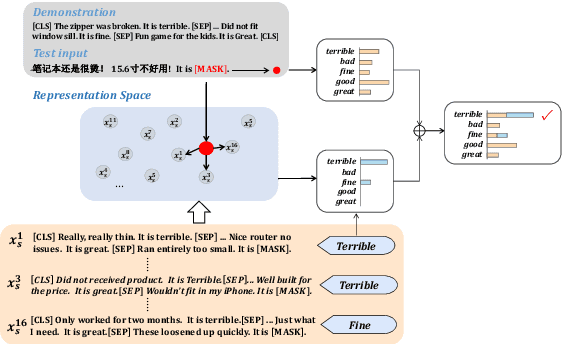
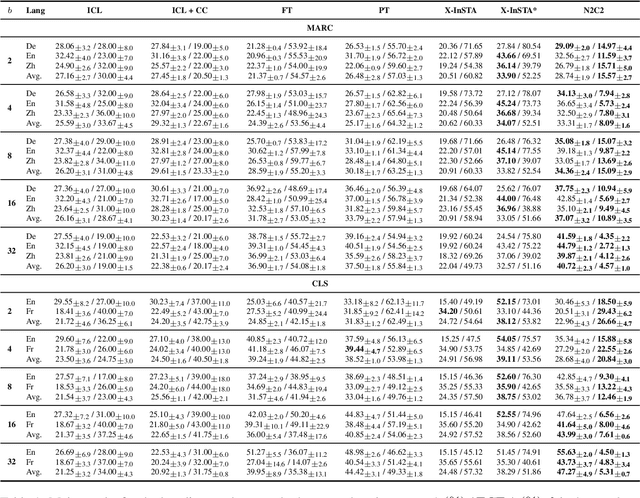
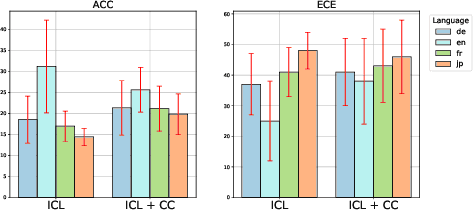
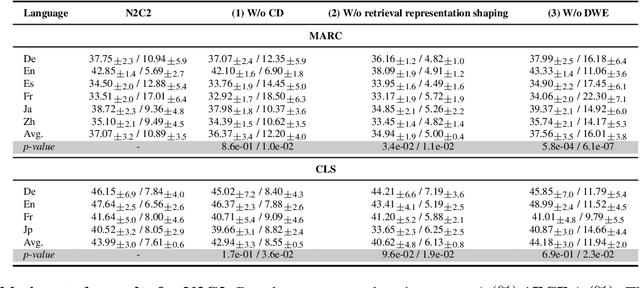
Abstract:Recent advancements of in-context learning (ICL) show language models can significantly improve their performance when demonstrations are provided. However, little attention has been paid to model calibration and prediction confidence of ICL in cross-lingual scenarios. To bridge this gap, we conduct a thorough analysis of ICL for cross-lingual sentiment classification. Our findings suggest that ICL performs poorly in cross-lingual scenarios, exhibiting low accuracy and presenting high calibration errors. In response, we propose a novel approach, N2C2, which employs a -nearest neighbors augmented classifier for prediction confidence calibration. N2C2 narrows the prediction gap by leveraging a datastore of cached few-shot instances. Specifically, N2C2 integrates the predictions from the datastore and incorporates confidence-aware distribution, semantically consistent retrieval representation, and adaptive neighbor combination modules to effectively utilize the limited number of supporting instances. Evaluation on two multilingual sentiment classification datasets demonstrates that N2C2 outperforms traditional ICL. It surpasses fine tuning, prompt tuning and recent state-of-the-art methods in terms of accuracy and calibration errors.
MetaXCR: Reinforcement-Based Meta-Transfer Learning for Cross-Lingual Commonsense Reasoning
Mar 09, 2025
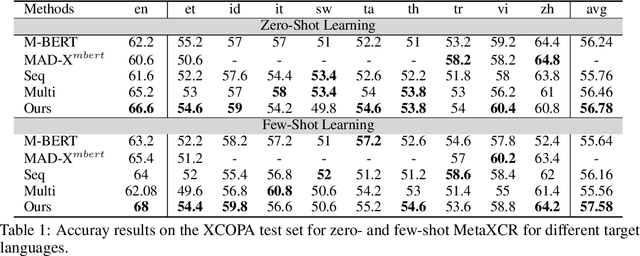

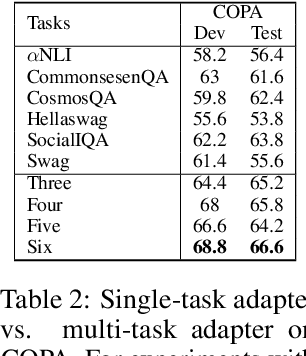
Abstract:Commonsense reasoning (CR) has been studied in many pieces of domain and has achieved great progress with the aid of large datasets. Unfortunately, most existing CR datasets are built in English, so most previous work focus on English. Furthermore, as the annotation of commonsense reasoning is costly, it is impossible to build a large dataset for every novel task. Therefore, there are growing appeals for Cross-lingual Low-Resource Commonsense Reasoning, which aims to leverage diverse existed English datasets to help the model adapt to new cross-lingual target datasets with limited labeled data. In this paper, we propose a multi-source adapter for cross-lingual low-resource Commonsense Reasoning (MetaXCR). In this framework, we first extend meta learning by incorporating multiple training datasets to learn a generalized task adapters across different tasks. Then, we further introduce a reinforcement-based sampling strategy to help the model sample the source task that is the most helpful to the target task. Finally, we introduce two types of cross-lingual meta-adaption methods to enhance the performance of models on target languages. Extensive experiments demonstrate MetaXCR is superior over state-of-the-arts, while being trained with fewer parameters than other work.
Evaluating Discourse Cohesion in Pre-trained Language Models
Mar 08, 2025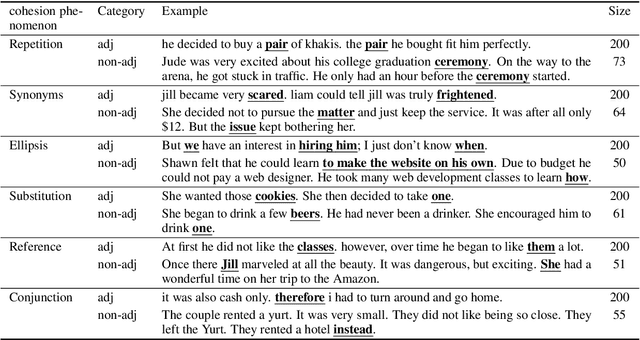
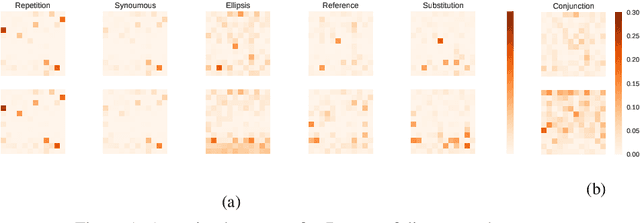


Abstract:Large pre-trained neural models have achieved remarkable success in natural language process (NLP), inspiring a growing body of research analyzing their ability from different aspects. In this paper, we propose a test suite to evaluate the cohesive ability of pre-trained language models. The test suite contains multiple cohesion phenomena between adjacent and non-adjacent sentences. We try to compare different pre-trained language models on these phenomena and analyze the experimental results,hoping more attention can be given to discourse cohesion in the future.
Similarity-Based Domain Adaptation with LLMs
Mar 07, 2025



Abstract:Unsupervised domain adaptation leverages abundant labeled data from various source domains to generalize onto unlabeled target data. Prior research has primarily focused on learning domain-invariant features across the source and target domains. However, these methods often require training a model using source domain data, which is time-consuming and can limit model usage for applications with different source data. This paper introduces a simple framework that utilizes the impressive generalization capabilities of Large Language Models (LLMs) for target data annotation without the need of source model training, followed by a novel similarity-based knowledge distillation loss. Our extensive experiments on cross-domain text classification reveal that our framework achieves impressive performance, specifically, 2.44\% accuracy improvement when compared to the SOTA method.
Tgea: An error-annotated dataset and benchmark tasks for text generation from pretrained language models
Mar 06, 2025Abstract:In order to deeply understand the capability of pretrained language models in text generation and conduct a diagnostic evaluation, we propose TGEA, an error-annotated dataset with multiple benchmark tasks for text generation from pretrained language models (PLMs). We use carefully selected prompt words to guide GPT-2 to generate candidate sentences, from which we select 47K for error annotation. Crowdsourced workers manually check each of these sentences and detect 12k erroneous sentences. We create an error taxonomy to cover 24 types of errors occurring in these erroneous sentences according to the nature of errors with respect to linguistics and knowledge (eg, common sense). For each erroneous span in PLM-generated sentences, we also detect another span that is closely associated with it. Each error is hence manually labeled with comprehensive annotations, including the span of the error, the associated span, minimal correction to the error, the type of the error, and rationale behind the error. Apart from the fully annotated dataset, we also present a detailed description of the data collection procedure, statistics and analysis of the dataset. This is the first dataset with comprehensive annotations for PLM-generated texts, which facilitates the diagnostic evaluation of PLM-based text generation. Furthermore, we use TGEA as a benchmark dataset and propose a series of automatic diagnosis tasks, including error detection, error type classification, associated span detection, error rationale generation, to further promote future study on the automatic error detection and correction on texts generated by pretrained language models.
 Add to Chrome
Add to Chrome Add to Firefox
Add to Firefox Add to Edge
Add to Edge